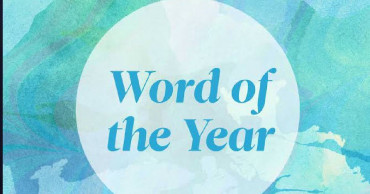word of the year
‘Brain rot’ named as Oxford Dictionaries’ word for 2024
It's a sentiment many share, and now it's been officially recognised: Oxford Dictionaries has named “brain rot” as its word of the year.
Oxford University Press announced on Monday that the phrase “brain rot” gained significant attention in 2024, with its usage increasing by 230% compared to the previous year, reports AP.
According to Oxford, “brain rot” refers to “the supposed decline of an individual’s mental or intellectual condition, particularly due to excessive consumption of content (now especially online) that is deemed trivial or unchallenging.”‘
Goblin Mode’: What does Oxford Dictionaries’ word of the year mean?
The selection of the word of the year aims to highlight “a word or phrase that encapsulates a defining theme of the past 12 months.”
The decision to choose “brain rot” came from a combination of public voting and analysis by Oxford lexicographers. It outpaced five other contenders: demure, slop, dynamic pricing, romantasy, and lore.
Although it may feel like a modern concept, the term “brain rot” was first used by Henry David Thoreau in his 1854 book, Walden, which celebrated nature, the report said.
Casper Grathwohl, President of Oxford Languages, noted that, in its contemporary sense, “’brain rot’ addresses one of the perceived risks of digital life and how we choose to spend our leisure time.”
“It represents an important continuation of the cultural discussion surrounding humanity and technology. It’s not surprising that so many people embraced the term, making it our choice for this year,” he stated.
Last year, the Oxford word of the year was “rizz,” a variation on charisma used to describe someone’s skill in attracting or seducing others.
In comparison, Collins Dictionary chose “brat” as its 2024 word of the year — a nod to the album title that epitomised the summer’s carefree spirit.
1 year ago
Merriam-Webster chooses vaccine as the 2021 word of the year
With an expanded definition to reflect the times, Merriam-Webster has declared an omnipresent truth as its 2021 word of the year: vaccine.
“This was a word that was extremely high in our data every single day in 2021,” Peter Sokolowski, Merriam-Webster’s editor-at-large, told The Associated Press ahead of Monday’s announcement.
“It really represents two different stories. One is the science story, which is this remarkable speed with which the vaccines were developed. But there’s also the debates regarding policy, politics and political affiliation. It’s one word that carries these two huge stories,” he said.
The selection follows “vax” as word of the year from the folks who publish the Oxford English Dictionary. And it comes after Merriam-Webster chose “pandemic” as tops in lookups last year on its online site.
Read: Omicron: What we know about the COVID-19 Variant so far
“The pandemic was the gun going off and now we have the aftereffects,” Sokolowski said.
At Merriam-Webster, lookups for “vaccine” increased 601% over 2020, when the first U.S. shot was administered in New York in December after quick development, and months of speculation and discussion over efficacy. The world’s first jab occurred earlier that month in the UK.
Compared to 2019, when there was little urgency or chatter about vaccines, Merriam-Webster logged an increase of 1,048% in lookups this year. Debates over inequitable distribution, vaccine mandates and boosters kept interest high, Sokolowski said. So did vaccine hesitancy and friction over vaccine passports.
The word “vaccine” wasn’t birthed in a day, or due to a single pandemic. The first known use stretches back to 1882 but references pop up earlier related to fluid from cowpox pustules used in inoculations, Sokolowski said. It was borrowed from the New Latin “vaccina,” which goes back to Latin’s feminine “vaccinus,” meaning “of or from a cow.” The Latin for cow is “vacca,” a word that might be akin to the Sanskrit “vasa,” according to Merriam-Webster.
Inoculation, on the other hand, dates to 1714, in one sense referring to the act of injecting an “inoculum.”
Earlier this year, Merriam-Webster added to its online entry for “vaccine” to cover all the talk of mRNA vaccines, or messenger vaccines such as those for COVID-19 developed by Pfizer-BioNTech and Moderna.
While other dictionary companies choose words of the year by committee, Merriam-Webster bases its selection on lookup data, paying close attention to spikes and, more recently, year-over-year increases in searches after weeding out evergreens. The company has been declaring a word of the year since 2008. Among its runners-up in the word biography of 2021:
Read: In omicron hot spot, somber mood as S Africa faces variant
INSURRECTION: Interest was driven by the deadly Jan. 6 siege on the U.S. Capitol. Arrests continue, as do congressional hearings over the attack by supporters of President Donald Trump. Some of Trump’s allies have resisted subpoenas, including Steve Bannon.
Searches for the word increased by 61,000% over 2020, Sokolowksi said.
INFRASTRUCTURE: President Joe Biden was able to deliver what Trump often spoke of but never achieved: A bipartisan infrastructure bill signed into law. When Biden proposed help with broadband access, eldercare and preschool, conversation changed from not only roads and bridges but “figurative infrastructure,” Sokolowski said.
“Many people asked, what is infrastructure if it’s not made out of steel or concrete? Infrastructure, in Latin, means underneath the structure,” he said.
PERSEVERANCE: It’s the name of NASA’s latest Mars rover. It landed Feb. 18, 2021. “Perseverance is the most sophisticated rover NASA has ever sent to the Red Planet, with a name that embodies NASA’s passion, and our nation’s capability, to take on and overcome challenges,” the space agency said.
Read: US to require vaccines for all border crossers in January
The name was thought up by Alexander Mather, a 14-year-old seventh-grader at Lake Braddock Secondary School in Burke, Virginia. He participated in an essay contest organized by NASA. He was one of 28,000 K-12 students to submit entries.
NOMAD: The word had its moment with the 2020 release of the film “Nomadland.” It went on to win three Oscars in April 2021, including best picture, director (Chloé Zhao) and actress (Frances McDormand). Zhao became the first woman of color to win best director.
The AP’s film writer Jake Coyle called the indie success “a plain-spoken meditation on solitude, grief and grit. He wrote that it “struck a chord in a pandemic-ravaged year. It made for an unlikely Oscar champ: A film about people who gravitate to the margins took center stage.”
Other words in Merriam-Webster’s Top 10: Cicada (we had an invasion), guardian (the Cleveland Indians became the Cleveland Guardians), meta (the lofty new name of Facebook’s parent company), cisgender (a gender identity that corresponds to one’s sex assigned at birth), woke (charged with politics and political correctness) and murraya (a tropical tree and the word that won the 2021 Scripps National Spelling Bee for 14-year-old Zaila Avant-garde).
4 years ago
Dictionary.com chooses `existential' as word of the year
Climate change, gun violence, the very nature of democracy and an angsty little movie star called Forky helped propel "existential" to Dictionary.com's word of the year.
6 years ago





